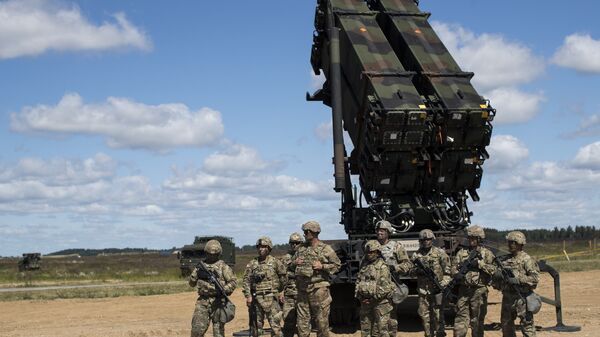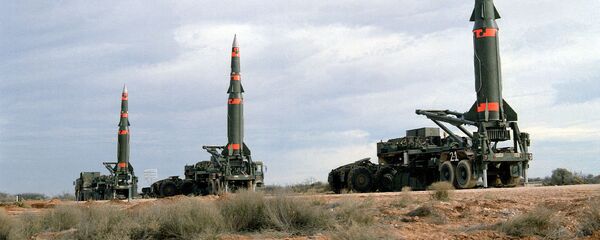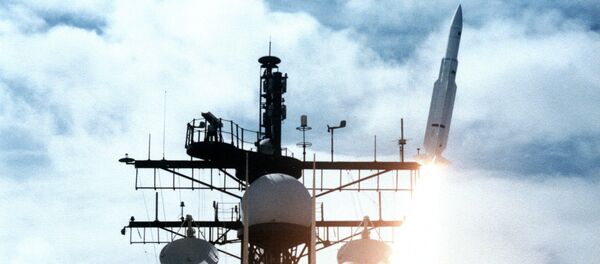Trump's announcement comes after Washington confirmed it would initiate its withdrawal from the 1987 Intermediate Nuclear Forces Treaty (INF) next month despite Moscow's attempts to preserve the deal.
Radio Sputnik discussed the future of the INF Treaty and the expansion of US missile defence network with Götz Neuneck, head of the Interdisciplinary Research Group on Disarmament, Arms Control and Risk Technologies, as well as deputy director of the Institute for Peace Research and Security Policy at the University of Hamburg.
Sputnik: What could be the consequences of US withdrawal from the INF Treaty?
Götz Neuneck: That's a good question, it's in the hands now of the Russian government and NATO to react on this. We should not forget there's still time.
READ MORE: Trump's INF Pull-Out: Why Germany's Arms Race Fears May Come True
There's still a six months notification before the US leaves the INF Treaty and there's still room to clarify the reciprocal accusations, and I would urge both governments to come back to serious discussions about the accusations, and if that does not happen then the chance of a new arms race on different levels is very likely.
Sputnik: Why is the Trump administration so insistent on abandoning it?
One explanation is that M. Bolton, who is the national security advisor, simply doesn't like arms control at all and he thinks the US needs to have maximum flexibility, and if you think in that category then restraint and limitations verification is not on the top agenda of the administration.
Sputnik: The Kremlin said that the White House is ignoring its proposals for a dialogue on the INF Treaty. How do you think the situation will develop further, will we see another arms race?
Götz Neuneck: I still hope that this will not happen because that would cost a lot of money, it would cost a lot of new additional nerves and perhaps very dangerous situations.
This is not an answer. I think they could try to find solutions together with Russia, but also Russia needs to explain, or the Russian government needs to explain what the function of these SSC-8 cruise missiles is.
There are different opinions about it. I think the accusations are not so dangerous so you can simply try to solve that. Russia has also accusations about the missile defence sites in Romania and in Poland, they say it can be used for offensive INF systems.
READ MORE: US Vice Admiral Calls for Boosting Navy to Counter Russia, China at Sea
Simply inspections, visits, modifications can solve that, but unfortunately both sides seem not to be equipped for solving that and that's very unfortunate, and that could become very dangerous.
Sputnik: What is your assessment of Washington's initiative to create a more aggressive space-based missile defence system?
Götz Neuneck: The idea seems to be to have first more sensors space. Sensors are passive, it's simply for tracking missiles.
Unfortunately, both have not yet found a way to limit this and this includes by the way also space and this includes also other challenges to strategic stability in the technical realm, such as hypersonic vehicles and cruise missiles.
READ MORE: US Failed to Provide Proof for Claims of Russian Missile Violating INF — Moscow
These are not subject to arms control, we need desperately some serious talks. President Putin and President Trump have promised to have these talks after the Helsinki summit but nothing happened and I think that's the most concern here that both sides seem not to be capable to make serious discussions on that and negotiations in the future.
Sputnik: To what extent is the United States prepared to compromise when it comes to its the global defence strategy and do you think that its recent moves could lead to similar decisions by other countries, namely, Russia and China?
Götz Neuneck: Of course all these countries will make their own assessment and it depends, of course, what the results would be. I think actually the US seems to be in expansive mode but that costs a lot of money, and we should not forget the Congress has to agree on these missile defence plans, and now the majority in the House of Representatives is in the Democratic hands, so there's still some way to limit these developments.
The views and opinions expressed by the contributors do not necessarily reflect those of Sputnik.




